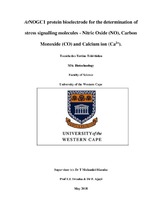| dc.contributor.advisor | Mulaudzi-Masuku, Takalani | |
| dc.contributor.advisor | Iwuoha, Emmanuel | |
| dc.contributor.advisor | Ajayi, Fanelwa | |
| dc.contributor.author | Tshivhidzo, Tsumbedzo Tertius | |
| dc.date.accessioned | 2018-08-21T10:27:38Z | |
| dc.date.available | 2018-08-21T10:27:38Z | |
| dc.date.issued | 2018 | |
| dc.identifier.uri | http://hdl.handle.net/11394/6332 | |
| dc.description | Magister Scientiae - MSc (Biotechnology) | en_US |
| dc.description.abstract | It has been estimated that the world population will reach about 10 billion by the year 2050 and in order to accommodate the increased demand of food, the world agricultural production needs to rise by 70 % in the year 2030. However, the realisation of the goal in food production is hindered by limited arable land caused by urbanisation, salinisation, desertification and environmental degradation. Furthermore, abiotic and biotic stresses affect plant growth and development, which lead to major crop losses. The long term goal of this study is to improve food security by producing genetically engineered agricultural crops that will be tolerant to diverse stresses. This research aims at developing stress tolerant crops through the determination of important signalling molecules and second messengers, such as nitric oxide (NO), carbon monoxide (CO) and calcium ion (Ca2+), which can bind to plant proteins such as AtNOGC1 in order to induce stress tolerance in plants. | en_US |
| dc.language.iso | en | en_US |
| dc.publisher | University of the Western Cape | en_US |
| dc.subject | Biosensor | |
| dc.subject | Calcium ion | |
| dc.subject | Carbon monoxide | |
| dc.subject | Cyclic voltammetry | |
| dc.subject | Electrochemistry | |
| dc.subject | Guanylyl cyclase | |
| dc.subject | Nitric oxide | |
| dc.title | AtNOGC1 protein bioelectrode for the determination of stress signalling molecules - Nitric Oxide (NO), Carbon Monoxide (CO) and Calcium ion (Ca2+) | en_US |
| dc.rights.holder | University of the Western Cape | en_US |

